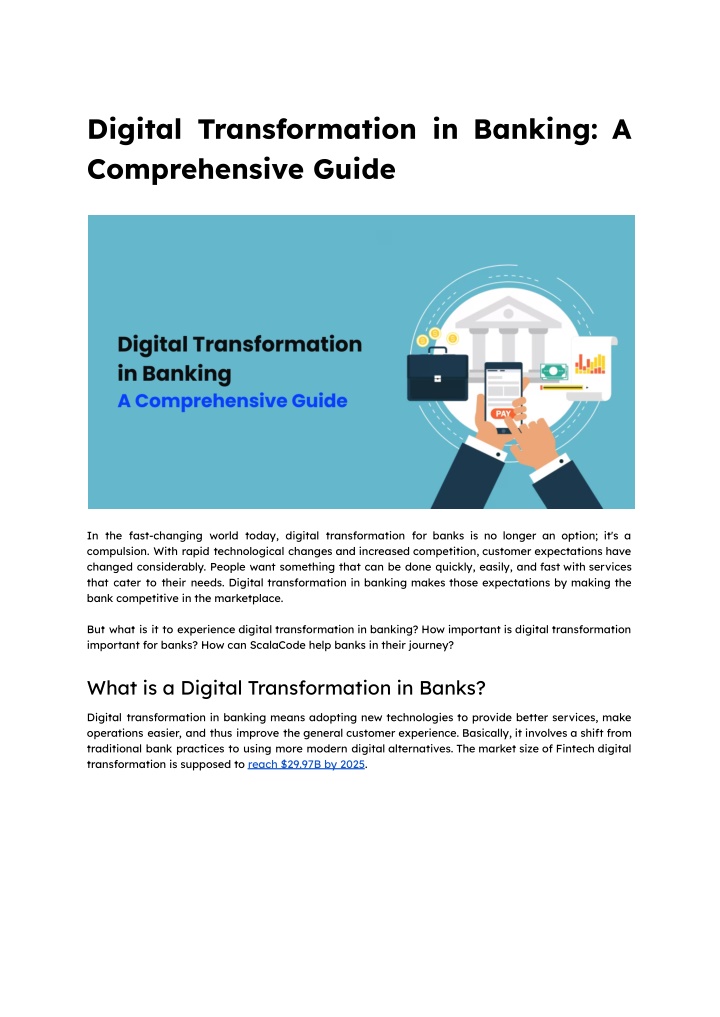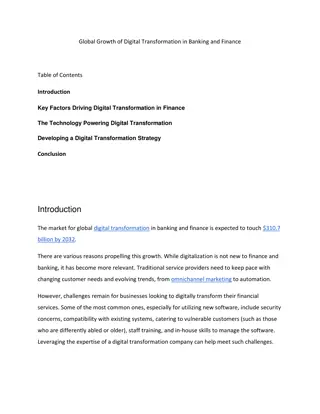
Digital Transformation in Banking: A Comprehensive Guide
In todayu2019s rapidly evolving financial landscape, digital transformation is revolutionizing the banking sector. This comprehensive guide delves into the key trends, technologies, and strategies that are shaping the future of banking.
Download Presentation

Please find below an Image/Link to download the presentation.
The content on the website is provided AS IS for your information and personal use only. It may not be sold, licensed, or shared on other websites without obtaining consent from the author. If you encounter any issues during the download, it is possible that the publisher has removed the file from their server.
You are allowed to download the files provided on this website for personal or commercial use, subject to the condition that they are used lawfully. All files are the property of their respective owners.
The content on the website is provided AS IS for your information and personal use only. It may not be sold, licensed, or shared on other websites without obtaining consent from the author.
E N D
Presentation Transcript
Digital Transformation in Banking: A Comprehensive Guide In the fast-changing world today, digital transformation for banks is no longer an option; it's a compulsion. With rapid technological changes and increased competition, customer expectations have changed considerably. People want something that can be done quickly, easily, and fast with services that cater to their needs. Digital transformation in banking makes those expectations by making the bank competitive in the marketplace. But what is it to experience digital transformation in banking? How important is digital transformation important for banks? How can ScalaCode help banks in their journey? What is a Digital Transformation in Banks? Digital transformation in banking means adopting new technologies to provide better services, make operations easier, and thus improve the general customer experience. Basically, it involves a shift from traditional bank practices to using more modern digital alternatives. The market size of Fintech digital transformation is supposed to reach $29.97B by 2025.
The application may be in terms of online banking systems or mobile applications and many other features that eventually result in automating some services. The aim is to eventually make banking activity relatively easier on all sides. Core Aspects of Digital Transformation Here are the key aspects of digital transformation: 1. Customer Experience The improvement in customer experiences is very important. It means developing user-friendly websites and mobile apps by making banking processes easier and accessible to all users. 2. Data Analytics To o?er customized services, understanding the behavior of customers with the help of data is crucial. Banks can outline those patterns and preferences that they need to address in their services to increase overall gratification. 3. Automation Automated processes mean less time in doing manual tasks and quicker operation. By automating frequent operations, banks can provide quicker services and thereby reduce errors. 4. Cloud Technology The implementation of cloud-based operations enables the banking industry to scale its operations easily. The use of cloud technology not only brings flexibility but also provides better resource management and reduces cost.
5. Cybersecurity Since banking services are becoming highly online, the safety of customer data is imperative. Cybersecurity measures are not only a means of safeguarding information but also ensure the customers about their accounts. Why Digital Transformation? Digital transformation is very important in the following ways. 1. Customer Satisfaction Banks can expect to lose customers to more innovative competitors if they fail to live up to these expectations to provide seamless, quick, and easy banking experiences for today's customers. Customers want to manage their finances from their phones and seek immediate support. 2. Minimization of Ine?ciency Digital tools help a bank operate much more e?ciently. Faster processing times and fewer errors help result in cost savings and better delivery of service, hence contributing to a good customer experience. 3. Sustaining Competition The banking sector remains one of the highly competitive business sectors. In addition, fintech institutions continue to emerge with novel products; hence, banks must establish themselves in digital transformation to remain current and provide their services competitively in the market. 4. Enhanced Security When the banking sector becomes more online, then security becomes even more important. Digital transformation enables the institution to acquire current and sophisticated security mechanisms, thereby safeguarding customer details and creating trust from the customers in o?ering the services. Steps to Digital Transformation If you are also thinking of implementing digital transformation in your banking firm, hiring a Fintech software development company is the first step you need to do. However, it's crucial to stay updated with the entire process. So, prepare yourself better. So, here are some steps for digital transformation you must know: 1. Audit Current Capabilities Banks must begin auditing their current technology and processes. Knowing where they stand presently enables them to pinpoint specific improvement areas, and where the investments and strategies would go. 2. Set Goals Goals for digital transformation need to be well set. Be it serving the customer better or making operations e?cient, fixed targets keep things on track and measurable.
3. Invest in Technology Invest in the right technology to make this transformation e?ective. That would mean updating the existing systems and adopting new tools, for example, artificial intelligence and machine learning, which could make banking services better. 4. Customer Experience A transformation strategy needs to focus on customer experience. User-friendly interfaces coupled with personalized services drawn from data insights may make any customer feel appreciated and understood. 5. Employee Training Employees are at the center of successful transformation in the light of digital. Extensive training of employees on new technologies and processes makes this transition e?ective. 6. Monitor and Adjust Monitoring continuously is also required. Gathering feedback and analyzing the data might help inform adjustments in banks transforming their service, ensuring transformation stays in the spotlight and aligns with goals by remaining e?ective. Digital Transformation Challenges Though digital transformation is a necessity to grow, it brings along its challenges. Adoption of Change Employees will resist the new technologies, which will hamper the changes. Communication about the changes and integrating necessary training will assure them can be done. Information Privacy The increased volumes of data will inevitably increase the requirement of having information guarded. This necessitates trust from customers whose data is being gathered. For this reason, the use and protection policies of the data will need to be communicated transparently to the customers. Extremely High Implementation Costs Investment in new technologies may be costlier, particularly in the short run. However, banks should see these investments as part and parcel of the steps towards long-term e?ciency and increased customer satisfaction. Integration Issues A new system's integration with the existing setup would be rather complicated. Thorough planning, combined with careful execution, would be absolutely vital to ensure an incident-free transfer process without harming the business processes in any way. Now, if you want to implement advanced digital transformation services for your bank, you need a reliable partner. And ScalaCode could be one of the best choices for this. It is a trusted digital
transformation company with expertise in delivering digital transformation services. The company adds value to the development of bespoke applications that meet every requirement that a bank needs, like developing mobile banking applications or high-performance backend systems. Moreover, ScalaCode creates automation tools that cut down manual work and reduce costs while adding speedy processing. Conclusion Digital transformation in banking, enhances customer experiences, operates e?ciently, and remains competitive. Although challenges are inherent, the benefits of the digital transformation stand out. Banks that navigate these changes will thrive in the digital age, providing better service to customers. ScalaCode supports these developments with customized solutions for the specific needs of the banking environment. So, if you have more doubts, feel free to contact us. Source URL: https://www.appideas.ai/blog/digital-transformation-in-banking






















